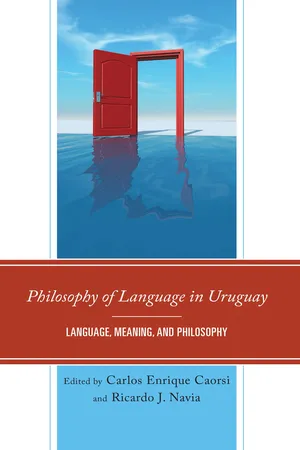
eBook - PDF
Philosophy of Language in Uruguay
Language, Meaning, and Philosophy
- 249 pages
- English
- PDF
- Available on iOS & Android
eBook - PDF
Philosophy of Language in Uruguay
Language, Meaning, and Philosophy
About this book
In Europe, and later in the United States, the revitalization of the philosophy of language emerged from the need to address certain perplexities concerning formal disciplines and to work out certain complexities found within philosophy. In Uruguay, philosophy of language began with Carlos Vaz Ferreira as an analysis of the common and argumentative uses of language but then expanded to address typically philosophical questions. Edited by Carlos Enrique Caorsi and Ricardo J. Navia, Philosophy of Language in Uruguay: Language, Meaning, and Philosophy demonstrates the different directions in which philosophy of language has developed in Uruguay in the last twenty years, giving a representative picture of how philosophical approaches from a linguistic perspective have developed in this Latin American country. Uruguayan philosophy has a very small international presence, but it has long produced works within the philosophical explorations of language that are worthy of being better known. The contributors dissect these explorations through epistemology, linguistics, argumentation, and cognitive sciences to discover how philosophers of language such as Vaz Ferreira have grown to understand the complexities of language and how it affects us today.
Frequently asked questions
Yes, you can cancel anytime from the Subscription tab in your account settings on the Perlego website. Your subscription will stay active until the end of your current billing period. Learn how to cancel your subscription.
No, books cannot be downloaded as external files, such as PDFs, for use outside of Perlego. However, you can download books within the Perlego app for offline reading on mobile or tablet. Learn more here.
Perlego offers two plans: Essential and Complete
- Essential is ideal for learners and professionals who enjoy exploring a wide range of subjects. Access the Essential Library with 800,000+ trusted titles and best-sellers across business, personal growth, and the humanities. Includes unlimited reading time and Standard Read Aloud voice.
- Complete: Perfect for advanced learners and researchers needing full, unrestricted access. Unlock 1.4M+ books across hundreds of subjects, including academic and specialized titles. The Complete Plan also includes advanced features like Premium Read Aloud and Research Assistant.
We are an online textbook subscription service, where you can get access to an entire online library for less than the price of a single book per month. With over 1 million books across 1000+ topics, we’ve got you covered! Learn more here.
Look out for the read-aloud symbol on your next book to see if you can listen to it. The read-aloud tool reads text aloud for you, highlighting the text as it is being read. You can pause it, speed it up and slow it down. Learn more here.
Yes! You can use the Perlego app on both iOS or Android devices to read anytime, anywhere — even offline. Perfect for commutes or when you’re on the go.
Please note we cannot support devices running on iOS 13 and Android 7 or earlier. Learn more about using the app.
Please note we cannot support devices running on iOS 13 and Android 7 or earlier. Learn more about using the app.
Yes, you can access Philosophy of Language in Uruguay by Carlos Enrique Caorsi,Ricardo J. Navia in PDF and/or ePUB format, as well as other popular books in Philosophy & Historical & Comparative Linguistics. We have over one million books available in our catalogue for you to explore.
Information
Table of contents
- Cover
- Half Title
- Series Page
- Title Page
- Copyright Page
- Dedication
- Contents
- Introduction
- Part I: Truth, Meaning, and Interpretation
- Chapter 1: Language and Reality in Vaz Ferreira
- Chapter 2: Russell and Strawson on Definite Descriptions
- Chapter 3: Meaning, Normativity, and the Effect of Triangulation
- Chapter 4: The Donald Davidson–Meredith Williams Debate on the Sociality and Normativity of Language
- Part II: Actual Debates
- Chapter 5: Between Truth Relativism and Nonindexical Contextualism about Predicates of Personal Taste
- Chapter 6: On Being Imperfectly Obliged to Maximal Charity in Argumentation
- Chapter 7: I Know What I Mean: First-Person Authority in Speech and Thought
- Part III: Logical and Linguistic Analysis of Some Central Philosophical Problems
- Chapter 8: Perceptual Verbs, Conceivability, and Quantifiers: George Berkeley’s Master Argument and Its Hidden Premise
- Chapter 9: Language, Concepts, and the Nature of Inference
- Chapter 10: On Temporal Representations: A Study from the Lexicon
- Chapter 11: Linguistics in Philosophy: Following Vendler’s Footsteps
- Index
- About the Contributors